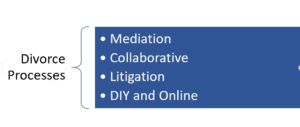
If you’re reading this, then obviously you’re thinking about ending your marriage. Before you initiate your divorce, I’m going to ask you to take a few steps to ensure the best outcome for you should you decide to move forward. This is not a decision to be taken lightly and a little preparation can go a long way.
The reality for lots of couples that have invested in each other for many years is that if you’re going to end the relationship, you now have to stop thinking emotionally and start thinking financially.
#1 Evaluate What You Really Know About Your Finances
If your answer is anything but “Oh, I handle all our finances, I know exactly where we are,” then you have work to do. If you have been out of touch with your family finances for more than five years, don’t even try to get caught up. Get yourself to a CDFA® (Certified Divorce Financial Analyst) ASAP! You can find one in your area by going to the Institute for Divorce Financial Analysts. Do this BEFORE you tell your spouse you want a divorce. Your CDFA® will help you do a little digging to get some information before the information mysteriously disappears. They’ll also help you see what your financial life after divorce might look like.
#2 Gather Documents Before your Divorce Starts
This is the one thing you can do to save yourself a ton of money in the divorce process. Anything you can gather before you meet with either an attorney, a mediator, or a CDFA® will reduce the amount you ultimately have to spend out-of-pocket. Here a quick list of must-have documents.
- 3 years of tax returns
- 6 months of bank statements on all accounts
- 6 months of statements on each of your marital and separate investment accounts including 401k, deferred
- compensation, ESPP, ESOP, 403b, 529, IRA, etc. If you are baffled by those different account types or you’re not
- even sure if your spouse has a retirement plan, get to a CDFA® now!
- Most recent 4 paystubs
- Most recent mortgage statement on any properties owned
- Copies of all insurance policies and annuities (the policies themselves as well as statements)
- VIN numbers and mileage on vehicles owned
- Most recent statements on debts, credit cards, car loans, etc.
- Details of any business interests, e.g. S Corps, LLC’s, and partnerships
#3 Get Organized
Once you’ve gathered all the data, find a way to keep it all organized. Some people create a 3-ring binder with tables for each section, others put all their documents in a protected electronic environment like Dropbox, iCloud, or Google Drive. This is best when you need quick and easy access in a mobile format. Again, this will save you a lot of money down the road.
#4 Research Alternative Divorce Processes

There are several ways to get a divorce, each with its own pros and cons. Which method you choose will be largely dictated by the relationship between you and your spouse. If you are afraid for your or your children’s safety for any reason at all of it your spouse is denying you access to enough cash to survive, get a lawyer.
If you believe you and your spouse will be able to rationally discuss and negotiate the details of your divorce and be fair and honest, you might consider a do-it-yourself divorce or use an internet service to guide you. Beware: just because you and your spouse are getting along today doesn’t mean it will always be this way.
Your county’s divorce website will most likely give you an overview of the process and forms you’ll need if you going the DIY approach. There are lots of cheap internet services, too, that can produce divorce forms for your jurisdiction, but not all counties accept their forms as-is. These cheaper alternatives may seem attractive upfront but the money it may take to correct any mistakes you make along the way could cost you thousands of dollars.
If your financial situation is a bit more complex, e.g., there’s a pension involved or one party is self-employed, or the idea
of DIY frightens you, then you should consider using a CDFA® as a financial neutral as part of a collaborative team
or as a mediator to help you craft a fair settlement. Your CDFA® may also be able to get your legal documents
prepared for you, too. When couples go this route, they are more likely to remain friends—it’s a respectful, honest way
to go through the process and saves both parties significant money by not having to pay expensive lawyers.
As a last resort, if one or both parties can’t manage to cooperate at any level and seem determined to go to war, then hiring attorneys may be your only option. Unfortunately, you’ll need to say goodbye to about $15,000 per spouse, at a minimum. A little preparation before you move forward with a divorce can go a long way towards reducing the cost of your divorce and creating a fair settlement. Wishing you a gentle divorce and a bright future!
The divorce process can be scary and overwhelming. Starting with a plan and professionals that you trust to guide you through the process can be key in making sure you’re ready for your future. If you’re thinking about divorce schedule your complimentary divorce strategy session where we’ll explore your options and connect you with any resources you might need.

